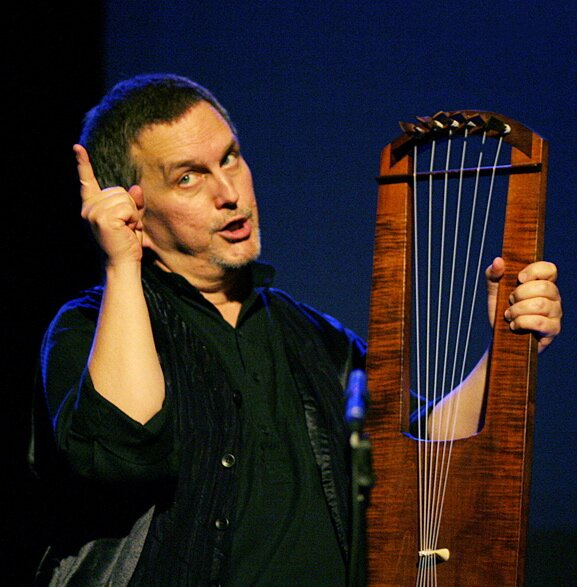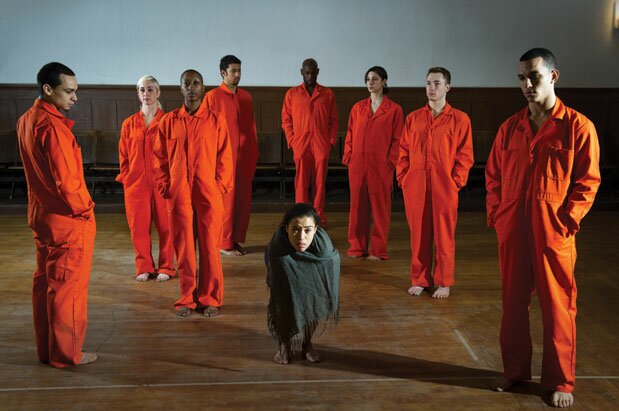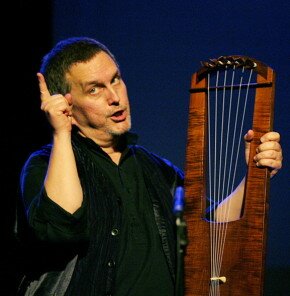Benjamin Bagby, voice and harp, gave a performance of the medieval epic poem Beowulf to a packed house at Town Hall last Saturday night, part of the Early Music Guild Series.
On the face of it this sounds straightforward. In fact, it’s anything but. Bagby, cofounder of the European medieval music performing group, Sequentia, has for many years now researched not just the stories performed by the “singers of tales” around the early Middle Ages (the 6th and 7th centuries), but how they were performed, how sung, how accompanied. Given that this is in the mists of European history, not much of which was recorded in detail, Bagby has had to draw on his extensive knowledge of music, history, language, and literature to figure out how these epics sounded.
Beowulf would nowadays be called a singspiel, a story sung and spoken — sometimes half-sung, sometimes half-spoken. Bagby’s performance is 100 minutes long (and this is only one-third of the saga) during which he is on stage throughout, telling, chanting, singing the tale with only short breaks of a minute or two to take a drink of water and retune the harp.
How did he learn dramatic ways of holding an audience with just his voice and a soft harp, holding it spellbound with nary a stir all that time? Probably the same way the old tale-tellers did, by long practice and observation.
The story of Beowulf starts with some genealogy, then sets the background of the story, and explains the problem. A monster, Grendel, comes out of the marsh nightly to devour warriors of the Danish king as they drink and talk in the great hall he has built. No one has been able to get rid of Grendel, and no one now stays the night there.
Enter Beowulf by sea with his own band of warriors, stating he will get rid of Grendel for the king. He is warmly welcomed except by one grouchy courtier who doesn’t like to think anyone would be a better warrior than he. He baits Beowulf drunkenly, but Beowulf demolishes him with a devastating verbal riposte. After all the king’s warriors have left, Grendel comes and Beowulf bests the monster in fair fight with no weapons, wresting off Grendel’s arm, whereupon the monster slinks away to die in the marsh in a “boiling pool of bloody dark water.” Beowulf posts the arm high above the hall for all to see, receives thanks and gifts from the king and everyone rejoices.
Bagby used a 6-string harp, which was built using some ancient remains as a guide to the wood, and studies into medieval modes for the tuning. It’s a quiet, oblong instrument, flat with curved ends, the six strings spread out and fixed at one end, then gathered to a small bridge just below the middle.
He used it to punctuate his words and to change moods, not so much to harmonize with his voice. Some of the time, Bagby acted as a straightforward narrator, but then would seamlessly change the timbre of his voice adding pitch, or just alter the quality. He was an old man speaking in the king’s voice, marvellously slurred as the tipsy courtier (his body changing stance as well); hushed, friendly, foreboding, confidential, angry, despondent, fierce, proud, violent, bold, boastful, sorrowful or triumphant according to the mood. In his solo performance, just Bagby and his harp, it was easy to imagine the great hall, decorated, peopled with courtiers and warriors, mead and weapons, the arrival by sea, the boat, the monster, the battle.
And all of this was performed in Middle English (see video clip from the full-length DVD). It helped that supertitles were on a screen above him and projected also on to the ceiling at the sides of Town Hall, but it was fascinating to recognize some of the words: seven, twelve, mist, mighty (pronounced michty), fen, fit, were some of them. He sat throughout on a stool, using one arm only to illustrate his words, his harp in the other.
Bagby has worked on other medieval epics — he and Sequentia have two CDs of musical reconstructions from the medieval Icelandic Edda, while a third CD, “Lost Songs of a Rheinland Harper,” showcases Latin and German songs from around the year 1000 — and he continues to develop his performance of them further. I last heard his Beowulf some 20 years ago. It’s more powerful now, and the supertitles help a lot. Perhaps he will bring it, or another one back here again in a few years?


